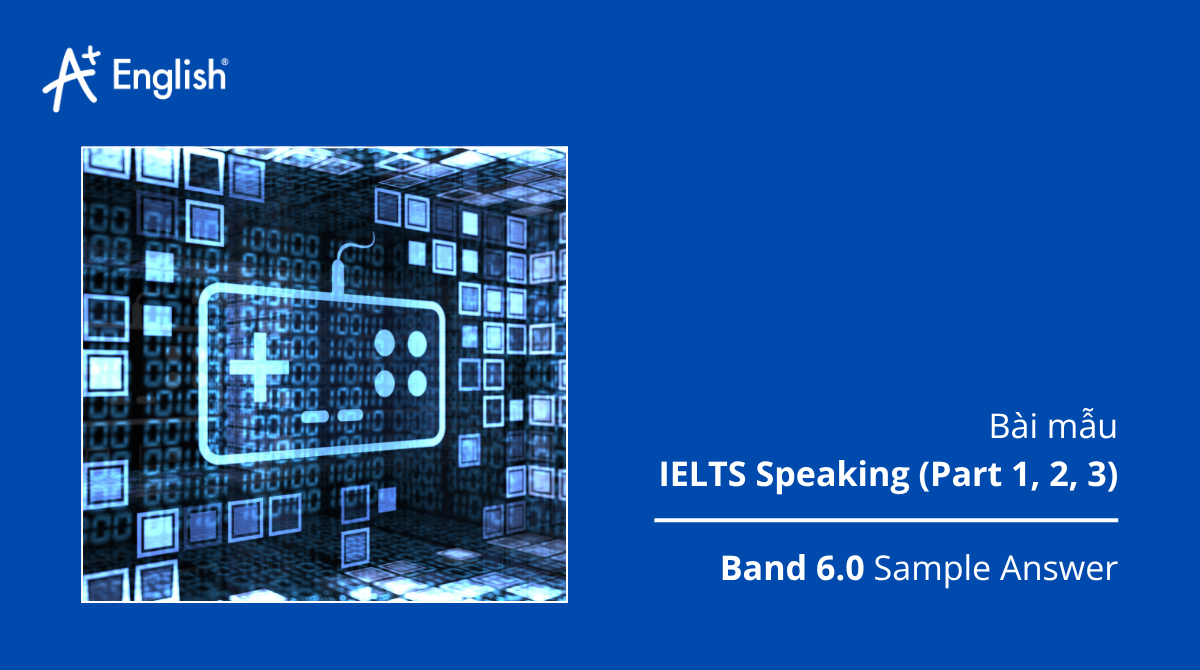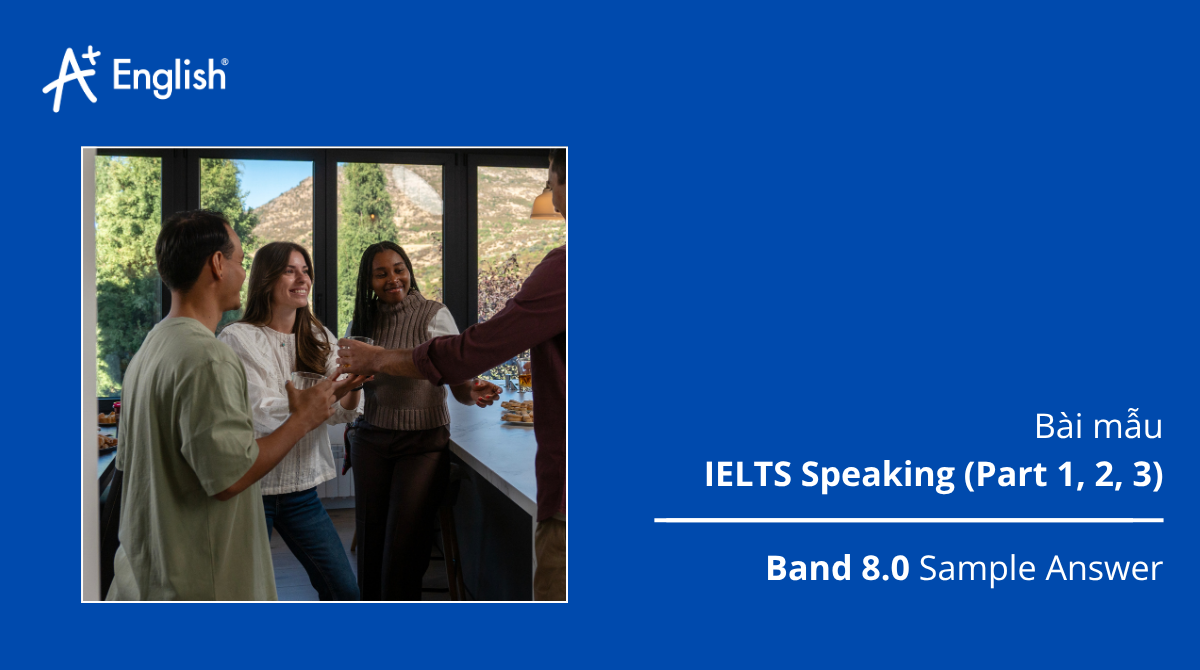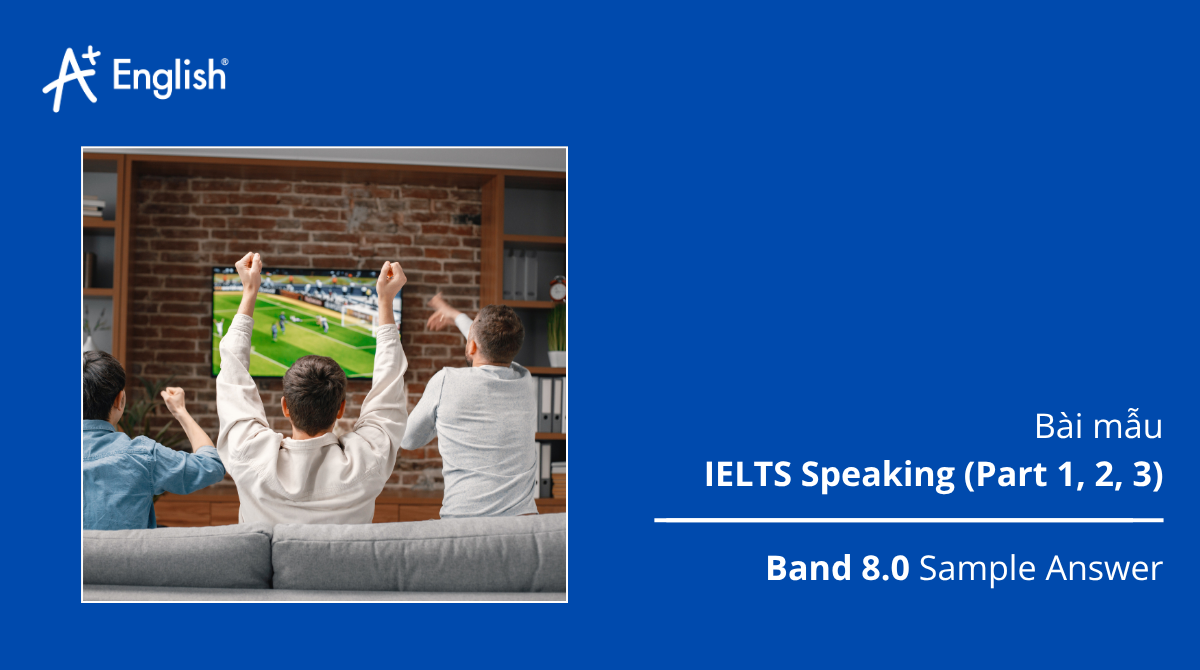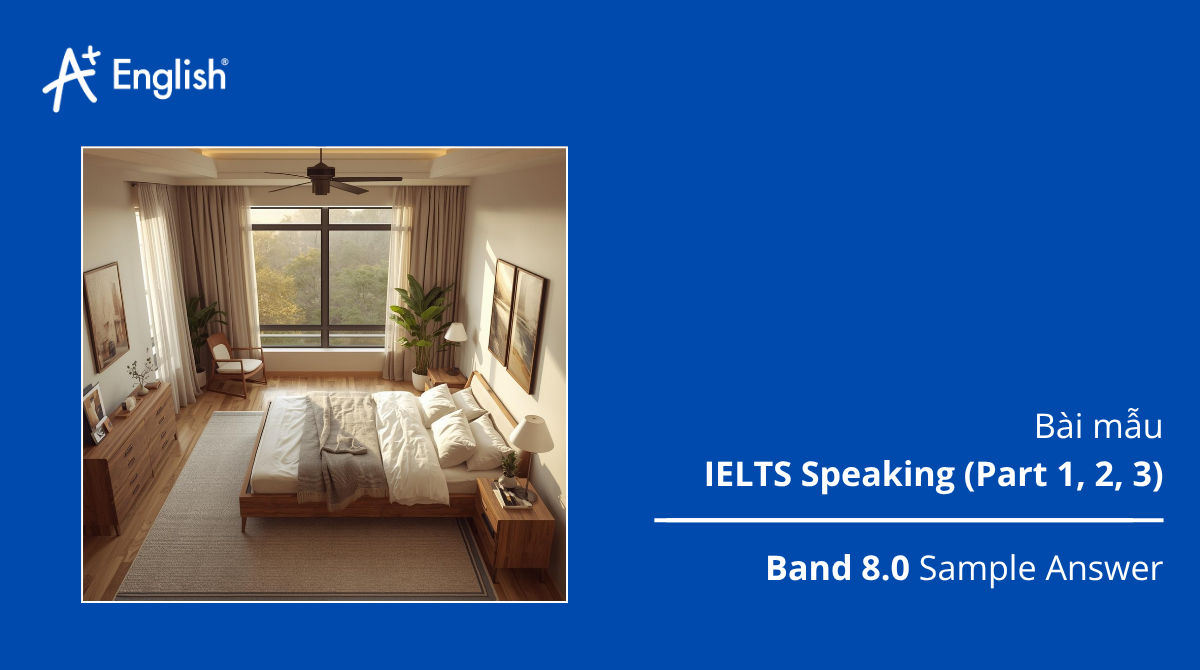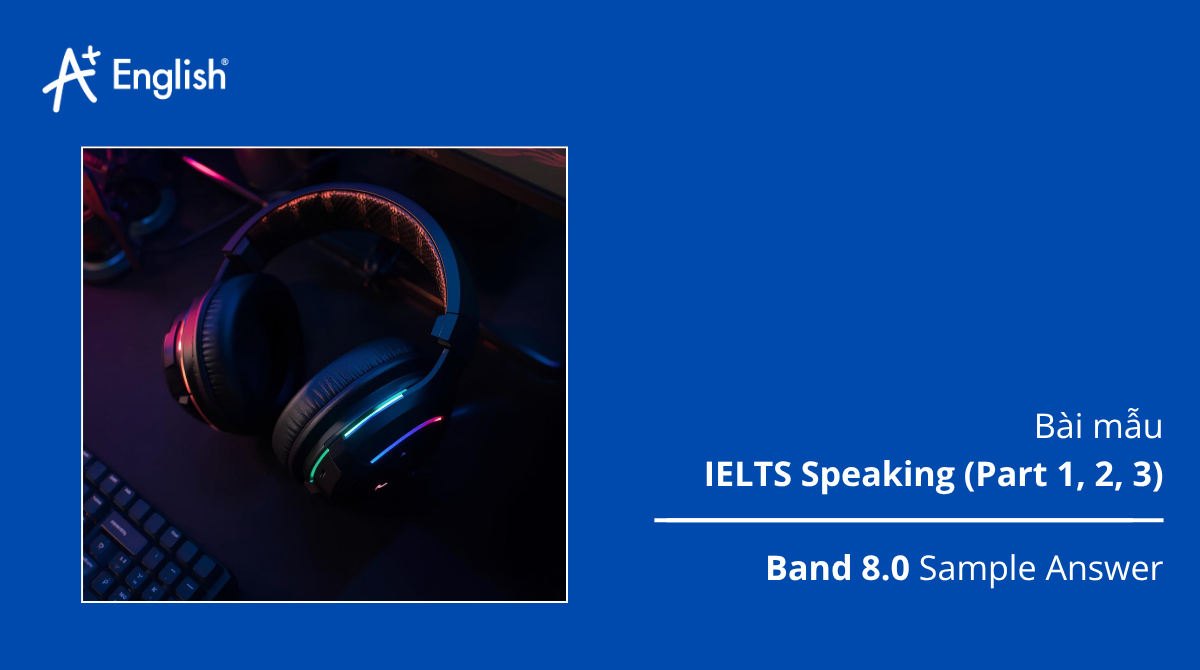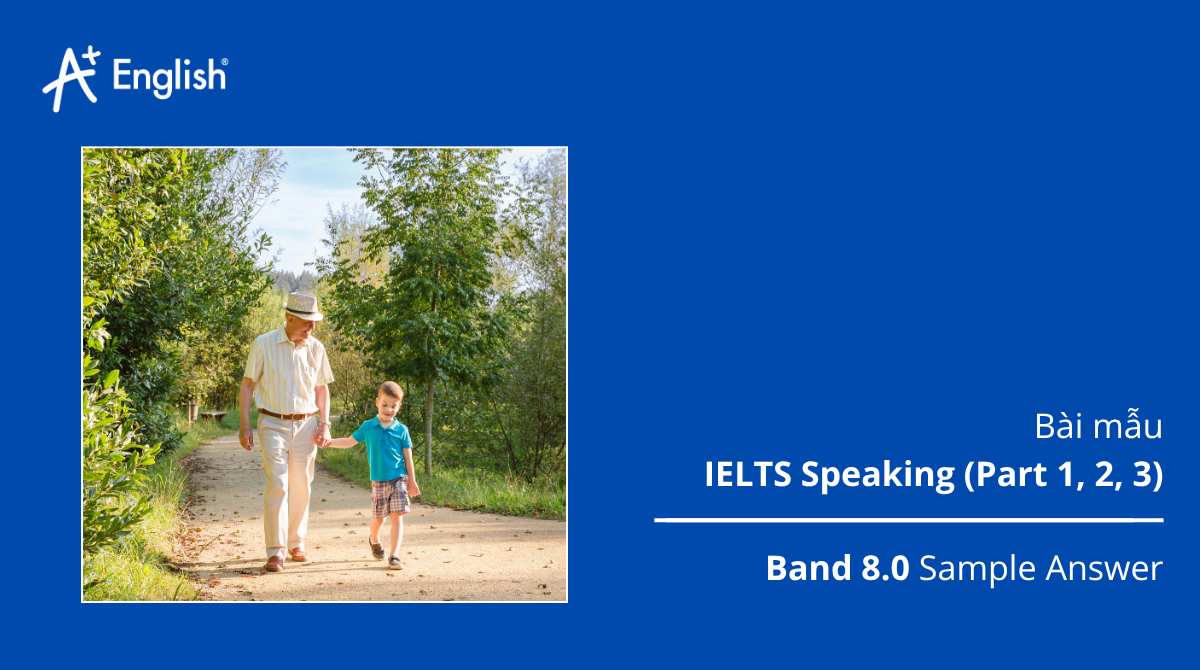A+ English xin giới thiệu đến các bạn bài mẫu IELTS Speaking band 6.0 với những câu trả lời ấn tượng và tự nhiên, giúp thí sinh ghi điểm cao trong kỳ thi.
Bài mẫu không chỉ gợi ý cách triển khai ý tưởng mạch lạc mà còn cung cấp từ vựng phong phú, cấu trúc câu đa dạng và cách diễn đạt tự nhiên, giúp bạn tự tin giao tiếp và thuyết phục giám khảo.
Hãy cùng khám phá ngay để nâng tầm kỹ năng Speaking của bạn nhé!
Nội dung chính
1. Đề bài IELTS Speaking (Assignment)
| Task 1:
How long have you studied at your school/college? What do you enjoy most about your studies? (Why?) Will you study at your school/college much longer? (Why/Why not?) |
| Task 2:
Describe a recent invention that has had a major impact on your life.You should say: When it was invented What it does How it has affected your life And explain the effect you think this invention has on society as a whole. |
| Task 3:
Should all students take science courses in high school? How can science be used by students in everyday life? What can the government do to encourage more scientific discoveries? Should governments, instead of private organizations, be responsible for developing new medications? Why is it important for scientists from different countries to freely share their medical research? How do you think medical research might change in the future? |
Source: MOCK TEST 1
2. Phân tích câu hỏi – Lập dàn ý (Analyze the topic – Outline)
Task 1
How long have you studied at your school/college?
- Tôi đã học ở trường/đại học này được bao lâu (ví dụ: 2 năm, 4 năm).
What do you enjoy most about your studies? (Why?)
- Tôi thích điều gì nhất về việc học (môn học yêu thích, môi trường học tập, giáo viên, bạn bè…).
- Lý do: Vì nó thú vị, hữu ích hoặc truyền cảm hứng.
Will you study at your school/college much longer? (Why/Why not?)
- Tôi sẽ học tiếp ở đây hay không (ví dụ: sắp tốt nghiệp, muốn học cao hơn, hoặc chuyển sang môi trường khác).
- Lý do: Vì muốn đạt được mục tiêu học tập hoặc nghề nghiệp.
Task 2
When it was invented:
- Công nghệ/thiết bị đó được phát minh khi nào (ví dụ: điện thoại thông minh, internet, trí tuệ nhân tạo).
What it does:
- Nó có chức năng gì? (ví dụ: giúp kết nối với mọi người, học tập trực tuyến, cải thiện sức khỏe, tăng hiệu suất làm việc).
How it has affected your life:
- Nó đã ảnh hưởng đến cuộc sống của bạn thế nào (tích cực hay tiêu cực, tiện lợi ra sao, có thay đổi gì lớn không).
Effect on society:
- Ảnh hưởng đến xã hội như thế nào (thúc đẩy giao tiếp, nâng cao y tế, cải thiện học tập…).
Task 3
Should all students take science courses in high school?
- Có, vì giúp phát triển tư duy logic, hiểu biết về tự nhiên.
- Không, nếu học sinh không muốn theo đuổi lĩnh vực này.
How can science be used by students in everyday life?
- Sử dụng khoa học để giải quyết vấn đề, nâng cao kỹ năng tư duy, sử dụng công nghệ trong học tập.
What can the government do to encourage more scientific discoveries?
- Cung cấp tài trợ nghiên cứu, phát triển giáo dục khoa học, khuyến khích hợp tác quốc tế.
Should governments, instead of private organizations, be responsible for developing new medications?
- Chính phủ nên tham gia để đảm bảo lợi ích công cộng, nhưng các tổ chức tư nhân cũng có vai trò quan trọng trong việc phát triển công nghệ.
Why is it important for scientists from different countries to freely share their medical research?
- Thúc đẩy tiến bộ khoa học nhanh hơn, đảm bảo lợi ích chung cho sức khỏe toàn cầu, tránh trùng lặp nghiên cứu.
How do you think medical research might change in the future?
- Sử dụng AI trong nghiên cứu, phát triển các phương pháp điều trị cá nhân hóa, công nghệ sinh học mới.
3. Bài Mẫu (Sample Essay) Band 6.0+
Task 1How long have you studied at your school/college?I’ve been studying at my current school for approximately three years now. During this time, I’ve gained valuable knowledge and experiences that have helped me grow academically and socially. What do you enjoy most about your studies? (Why?)I particularly enjoy the recess periods when I get to play football with my classmates. It’s not only a great way to relieve stress but also helps me strengthen my friendships and improve my teamwork skills, which I find very rewarding. Will you study at your school/college much longer? (Why/Why not?)Yes, I still have a couple of years left before graduation, so I’ll definitely continue studying here. Completing my education is essential for achieving my future goals and preparing for university. |
| Task 2
Reflecting on a recent invention that has significantly impacted my life, the rise of online gaming platforms like Roblox comes to mind. Introduced in 2006, Roblox has evolved into a vast virtual universe where users can create and explore games crafted by others. Its accessibility and the creativity it fosters have made it a staple in my leisure activities. What makes Roblox stand out is its user-generated content. Players aren’t just limited to playing games; they can design their own, offering a unique blend of creativity and entertainment. This platform has allowed me to connect with friends and engage in collaborative projects, even without stepping outside—a boon for someone like me who doesn’t venture out often. The impact on my life has been profound. Roblox has provided an avenue for social interaction, creativity, and problem-solving. It’s more than just a game; it’s a community where I’ve learned to collaborate, think critically, and express myself creatively. These experiences have been invaluable, especially during times when outdoor activities weren’t feasible. On a broader scale, platforms like Roblox have revolutionized the gaming industry. They’ve democratized game development, allowing anyone with an idea to bring it to life. This shift has led to a more diverse range of games and experiences, catering to a wide array of interests and age groups. Moreover, during periods when physical interaction was limited globally, such platforms provided a means for people to connect, socialize, and find joy. In essence, Roblox exemplifies how digital innovations can reshape our recreational activities, offering new ways to learn, connect, and entertain ourselves. |
Task 3Should all students take science courses in high school?Well, I would say absolutely, all students should engage in science courses during high school. You see, science education fosters critical thinking and a deeper understanding of the world around us. It equips students with problem-solving skills and promotes logical reasoning. And, even for those not pursuing science-related careers, the analytical skills gained are invaluable in everyday decision-making. Moreover, considering how rapidly our technological society is advancing, having a basic comprehension of scientific principles is essential to navigate and understand the innovations that shape our lives. How can science be used by students in everyday life?Alright, so when you think about it, science permeates our daily activities in numerous ways. For instance, you know, understanding nutritional information involves basic biology and chemistry, which really helps when making healthier food choices. Also, physics principles explain why wearing seatbelts is crucial for safety. Plus, environmental science educates students on sustainable practices, encouraging actions like recycling and energy conservation. By grasping scientific concepts, students can make informed decisions, solve everyday problems, and contribute positively to society. What can the government do to encourage more scientific discoveries?Hmm, let me see. Well, governments play a pivotal role in fostering scientific innovation. By allocating funds for research and development, they provide resources necessary for groundbreaking studies. Also, implementing policies that offer tax incentives to companies investing in research can stimulate private sector participation. And, of course, integrating robust science curricula in schools and promoting STEM (Science, Technology, Engineering, and Mathematics) education can cultivate a culture that values and pursues scientific endeavors. Public recognition and awards for scientific achievements also serve to inspire and motivate budding scientists. Should governments, instead of private organizations, be responsible for developing new medications?Now, that’s a really good question. I think both governments and private organizations have crucial roles in medication development. You see, governments can focus on public health needs, investing in research for diseases that may not be profitable but are essential for societal well-being. Meanwhile, private organizations, driven by competition, often bring efficiency and innovation to the table. So, really, a collaborative approach ensures that while public health priorities are addressed, the efficiency and innovation of the private sector are harnessed, leading to comprehensive healthcare solutions. Why is it important for scientists from different countries to freely share their medical research?Well, if you think about it, global collaboration in medical research really accelerates the discovery of treatments and cures. When scientists share data and findings, it prevents redundant efforts, saving time and resources. This collective approach is especially vital during global health crises, such as pandemics, where rapid information exchange can lead to swift solutions. And, of course, diverse perspectives enrich research quality, leading to more robust and universally applicable medical advancements. How do you think medical research might change in the future?Alright, so looking ahead, I think the future of medical research is poised for some truly transformative changes. For example, the integration of artificial intelligence and machine learning can analyze vast datasets, identifying patterns and potential treatments faster than traditional methods. Also, personalized medicine, where treatments are tailored based on an individual’s genetic makeup, is becoming more prevalent, promising more effective interventions. Not to mention, advancements in biotechnology, such as CRISPR gene-editing, offer potential cures for genetic disorders. And honestly, I think collaborative platforms and open-access journals are likely to become standard, ensuring wider dissemination of knowledge and fostering global partnerships. |
Dịch
| Task 1
Bạn đã học ở trường/đại học của mình được bao lâu rồi? Mình đã học ở ngôi trường hiện tại khoảng ba năm rồi. Trong thời gian đó, mình đã tích lũy được nhiều kiến thức quý báu và trải nghiệm giúp mình phát triển cả về mặt học thuật và xã hội. Bạn thích điều gì nhất trong việc học của mình? (Tại sao?) Mình đặc biệt thích các giờ ra chơi khi được chơi bóng đá với các bạn cùng lớp. Điều này không chỉ giúp mình giảm căng thẳng mà còn giúp củng cố tình bạn và cải thiện kỹ năng làm việc nhóm, điều mà mình thấy rất bổ ích. Bạn sẽ học ở trường/đại học của mình lâu hơn nữa không? (Tại sao hoặc tại sao không?) Có, mình vẫn còn vài năm nữa trước khi tốt nghiệp, nên chắc chắn mình sẽ tiếp tục học ở đây. Hoàn thành việc học rất quan trọng để mình đạt được các mục tiêu trong tương lai và chuẩn bị cho việc vào đại học. |
| Task 2
Khi nghĩ về một phát minh gần đây đã ảnh hưởng đáng kể đến cuộc sống của mình, mình nghĩ ngay đến sự phát triển của các nền tảng trò chơi trực tuyến như Roblox. Được giới thiệu vào năm 2006, Roblox đã phát triển thành một vũ trụ ảo rộng lớn, nơi người dùng có thể tạo ra và khám phá các trò chơi do người khác tạo ra. Khả năng tiếp cận và sự sáng tạo mà nó khuyến khích đã khiến nó trở thành một phần không thể thiếu trong các hoạt động giải trí của mình.Điều khiến Roblox nổi bật chính là nội dung do người dùng tạo ra. Người chơi không chỉ giới hạn trong việc chơi các trò chơi; họ có thể tự thiết kế trò chơi của mình, mang đến một sự kết hợp độc đáo giữa sáng tạo và giải trí. Nền tảng này đã cho phép mình kết nối với bạn bè và tham gia các dự án hợp tác, thậm chí không cần phải bước ra ngoài – một điều tuyệt vời cho những người như mình, vốn không thường ra ngoài nhiều.Tác động của Roblox lên cuộc sống của mình là rất sâu sắc. Nó mang lại cho mình cơ hội để tương tác xã hội, phát triển sáng tạo và rèn luyện khả năng giải quyết vấn đề. Nó không chỉ là một trò chơi; mà là một cộng đồng nơi mình đã học cách hợp tác, suy nghĩ có tư duy phản biện, và thể hiện sự sáng tạo của bản thân. Những trải nghiệm này thật sự vô giá, đặc biệt là trong những thời điểm mà các hoạt động ngoài trời không thể thực hiện được.Trên quy mô rộng lớn hơn, các nền tảng như Roblox đã cách mạng hóa ngành công nghiệp trò chơi. Chúng đã dân chủ hóa việc phát triển trò chơi, cho phép bất kỳ ai có ý tưởng đều có thể biến nó thành hiện thực. Sự thay đổi này đã dẫn đến sự đa dạng hơn trong các trò chơi và trải nghiệm, đáp ứng được nhiều sở thích và độ tuổi khác nhau. Hơn nữa, trong thời kỳ mà các tương tác vật lý bị hạn chế trên toàn cầu, các nền tảng như thế này đã cung cấp một phương tiện để mọi người kết nối, giao lưu và tìm thấy niềm vui.Tóm lại, Roblox là một ví dụ điển hình cho thấy cách mà các sáng tạo kỹ thuật số có thể định hình lại các hoạt động giải trí của chúng ta, mang đến những cách thức mới để học hỏi, kết nối và giải trí. |
| Task 3
Tất cả học sinh có nên học các khóa học khoa học ở trường trung học không? Khoa học có thể được học sinh sử dụng trong cuộc sống hàng ngày như thế nào? Chính phủ có thể làm gì để khuyến khích nhiều khám phá khoa học hơn? Chính phủ thay vì các tổ chức tư nhân có nên chịu trách nhiệm phát triển thuốc mới không? Tại sao điều quan trọng là các nhà khoa học từ các quốc gia khác nhau cần tự do chia sẻ nghiên cứu y học của họ? Bạn nghĩ nghiên cứu y học sẽ thay đổi như thế nào trong tương lai? |
4. Từ vựng (Vocabulary)
- Innovations /ˌɪn.əˈveɪ.ʃənz/ – B2
Part of Speech: Noun (Plural)
Meaning: Những đổi mới, sáng kiến
Collocations: Technological innovations – Những đổi mới công nghệ, Drive innovations – Thúc đẩy sự đổi mới
Example Sentence: Technological innovations have transformed the way we communicate.
Translation: Những đổi mới công nghệ đã thay đổi cách chúng ta giao tiếp. - Accessible /əkˈses.ə.bəl/ – B2
Part of Speech: Adjective
Meaning: Có thể tiếp cận được, dễ dàng sử dụng
Collocations: Accessible information – Thông tin dễ tiếp cận, Make something accessible – Làm cho thứ gì đó dễ tiếp cận
Example Sentence: The museum is easily accessible by public transport.
Translation: Bảo tàng dễ dàng tiếp cận bằng phương tiện công cộng. - Profound /prəˈfaʊnd/ – B2
Part of Speech: Adjective
Meaning: Sâu sắc, thâm thúy
Collocations: Profound impact – Tác động sâu sắc, Profound understanding – Hiểu biết sâu sắc
Example Sentence: The speech had a profound influence on the audience.
Translation: Bài phát biểu có ảnh hưởng sâu sắc đến khán giả.
- Collaboration /kəˌlæb.əˈreɪ.ʃən/ – B2
Part of Speech: Noun
Meaning: Sự hợp tác
Collocations: International collaboration – Hợp tác quốc tế, Collaboration between companies – Sự hợp tác giữa các công ty
Example Sentence: The project was a result of collaboration between several universities.
Translation: Dự án là kết quả của sự hợp tác giữa nhiều trường đại học. - Comprehension /ˌkɒm.prɪˈhen.ʃən/ – B2
Part of Speech: Noun
Meaning: Sự hiểu, khả năng hiểu
Collocations: Reading comprehension – Khả năng hiểu đọc, Listening comprehension – Khả năng hiểu nghe
Example Sentence: Her comprehension of complex mathematical concepts is impressive.
Translation: Khả năng hiểu các khái niệm toán học phức tạp của cô ấy rất ấn tượng. - Allocate /ˈæl.ə.keɪt/ – B2
Part of Speech: Verb
Meaning: Phân bổ, chỉ định
Collocations: Allocate resources – Phân bổ nguồn lực, Allocate time – Phân bổ thời gian
Example Sentence: The company has allocated funds for the new project.
Translation: Công ty đã phân bổ ngân quỹ cho dự án mới. - Incentive /ɪnˈsen.tɪv/ – B2
Part of Speech: Noun
Meaning: Sự khuyến khích, động cơ
Collocations: Financial incentive – Động cơ tài chính, Provide an incentive – Cung cấp sự khuyến khích
Example Sentence: The government offers tax incentives to encourage investment.
Translation: Chính phủ cung cấp các ưu đãi thuế để khuyến khích đầu tư. - Dissemination /dɪˌsem.ɪˈneɪ.ʃən/ – B2
Part of Speech: Noun
Meaning: Sự phổ biến, sự truyền bá
Collocations: Dissemination of information – Sự phổ biến thông tin, Rapid dissemination – Sự truyền bá nhanh chóng
Example Sentence: The dissemination of research findings is crucial for scientific progress.
Translation: Việc phổ biến các kết quả nghiên cứu là quan trọng cho tiến bộ khoa học. - Advancements /ədˈvɑːns.mənts/ – B2
Part of Speech: Noun (Plural)
Meaning: Những tiến bộ, sự tiến triển
Collocations: Technological advancements – Những tiến bộ công nghệ, Medical advancements – Những tiến bộ y học
Example Sentence: Recent advancements in AI are changing various industries.
Translation: Những tiến bộ gần đây trong trí tuệ nhân tạo đang thay đổi nhiều ngành công nghiệp. - Framework /ˈfreɪm.wɜːk/ – B2
Part of Speech: Noun
Meaning: Khung, cơ cấu tổ chức
Collocations: Legal framework – Khung pháp lý, Conceptual framework – Khung khái niệm
Example Sentence: The framework of the project is clearly outlined in the proposal.
Translation: Khung của dự án được nêu rõ ràng trong đề xuất.
5. Thành ngữ (Idioms)
- Step outside : Ra khỏi nhà, bước ra khỏi không gian quen thuộc (nghĩa bóng chỉ việc hòa nhập xã hội hoặc tham gia các hoạt động ngoài trời).
Câu ví dụ: Roblox has allowed me to connect with friends and engage in collaborative projects, even without stepping outside.
Dịch câu: Roblox đã giúp tôi kết nối với bạn bè và tham gia vào các dự án hợp tác, ngay cả khi không cần phải ra ngoài. - More than just a game : Không chỉ đơn thuần là một trò chơi – ám chỉ điều gì đó có ý nghĩa sâu sắc hoặc nhiều giá trị hơn vẻ bề ngoài.
Câu ví dụ: It’s more than just a game; it’s a community where I’ve learned to collaborate, think critically, and express myself creatively.
Dịch câu: Nó không chỉ là một trò chơi đơn thuần; đó là một cộng đồng nơi tôi học được cách hợp tác, tư duy phản biện và thể hiện bản thân một cách sáng tạo. - A deeper understanding of the world around us : Hiểu biết sâu sắc hơn về thế giới xung quanh – không chỉ là kiến thức bề mặt mà là sự thấu hiểu bản chất.
Câu ví dụ: Science education fosters critical thinking and a deeper understanding of the world around us.
Dịch câu: Giáo dục khoa học thúc đẩy tư duy phản biện và giúp hiểu sâu hơn về thế giới xung quanh chúng ta. - Play a pivotal role : Đóng vai trò then chốt, giữ vị trí rất quan trọng trong một quá trình.
Câu ví dụ: Governments play a pivotal role in fostering scientific innovation
Dịch câu: Chính phủ đóng vai trò then chốt trong việc thúc đẩy đổi mới khoa học. - A collaborative approach : Một phương pháp tiếp cận dựa trên sự hợp tác giữa nhiều bên để đạt hiệu quả tốt hơn.
Câu ví dụ: A collaborative approach ensures that while public health priorities are addressed, the innovation of the private sector is not overlooked.
Dịch câu: Một phương pháp tiếp cận hợp tác đảm bảo rằng các ưu tiên về sức khỏe cộng đồng được giải quyết mà không bỏ qua sự đổi mới từ khu vực tư nhân.
6. Ngữ pháp
1. Cấu trúc danh động từ (Gerund)
- Công thức: V-ing (danh động từ) + (Tân ngữ/ Bổ ngữ)
- Nghĩa tiếng Việt: Dùng danh động từ để diễn tả một hành động như một danh từ, thường được dùng làm chủ ngữ hoặc tân ngữ trong câu.
- Bối cảnh sử dụng: Dùng để nói về hoạt động chung hoặc sở thích.
- Câu ví dụ tiếng Anh: Playing football during recess helps me break the ice with my classmates.
- Dịch câu: Chơi bóng đá trong giờ giải lao giúp tôi làm quen với các bạn cùng lớp.
2. Cấu trúc cụm động từ nguyên mẫu (To-infinitive phrase)
- Công thức: To + Verb (động từ nguyên mẫu) + (Tân ngữ/ Bổ ngữ)
- Nghĩa tiếng Việt: Thể hiện mục đích, hoặc là tân ngữ của một số động từ.
- Bối cảnh sử dụng: Dùng để chỉ ra lý do hoặc mục đích của một hành động.
- Câu ví dụ tiếng Anh: The government offers tax incentives to encourage investment.
- Dịch câu: Chính phủ cung cấp các ưu đãi thuế để khuyến khích đầu tư.
3. Cấu trúc Cụm Danh từ mở rộng (Noun Phrase Expansion)
- Công thức: Tính từ/ Cụm từ bổ nghĩa + Danh từ chính
- Nghĩa tiếng Việt: Bổ sung thêm ý nghĩa cho danh từ, làm cho câu văn chi tiết hơn.
- Bối cảnh sử dụng: Dùng để mô tả các khái niệm phức tạp hoặc các ý tưởng trừu tượng.
- Câu ví dụ tiếng Anh: Recent advancements in AI are changing various industries.
- Dịch câu: Những tiến bộ gần đây trong trí tuệ nhân tạo đang thay đổi nhiều ngành công nghiệp.
4. Cấu trúc Cụm động từ ghép (Phrasal Verbs)
- Công thức: Động từ chính + Giới từ/ Trạng từ
- Nghĩa tiếng Việt: Các cụm từ cố định có ý nghĩa cụ thể khác với nghĩa gốc của động từ chính.
- Bối cảnh sử dụng: Thể hiện hành động, tình huống, hoặc trạng thái cụ thể.
- Câu ví dụ tiếng Anh: The dissemination of research findings is crucial for scientific progress.
- Dịch câu: Việc phổ biến các kết quả nghiên cứu là quan trọng cho tiến bộ khoa học.
5. Cấu trúc Cụm Tính từ (Adjective Phrases)
- Công thức: Tính từ chính + Cụm từ bổ nghĩa (giới từ, trạng từ, hoặc cụm động từ nguyên mẫu)
- Nghĩa tiếng Việt: Mở rộng ý nghĩa của tính từ chính, giúp câu diễn đạt rõ ràng hơn.
- Bối cảnh sử dụng: Miêu tả trạng thái hoặc đặc điểm cụ thể của một đối tượng.
- Câu ví dụ tiếng Anh: Platforms like Roblox have revolutionized the gaming industry.
- Dịch câu: Các nền tảng như Roblox đã cách mạng hóa ngành công nghiệp trò chơi điện tử.
7. Các hình thái thể hiện sự lưu loát
Use of Cohesive Devices (Logical Connectors, Pronouns, Conjunctions):
Logical connectors: Moreover, Additionally, On a broader scale, Absolutely, Both, In essence
Conjunctions: and, but,
Pronouns: it, they,
Spoken vs Written Language Features:
Sử dụng các cụm từ mang tính diễn đạt cao như:”What makes Roblox stand out is…”
Ngắt câu để nhấn mạnh: “It’s more than just a game; it’s a community…” Điều này tạo cảm giác tự nhiên khi giao tiếp, giúp người nghe dễ theo dõi.
Cách nhấn mạnh (emphasis) được tạo ra bằng việc lựa chọn từ mạnh và cấu trúc câu nhấn ý.
8. Phát âm
1. Chunks and Meaningful Utterances (Cụm từ quan trọng khi nói)
Nên chia câu thành các khối ý nhỏ (chunks) để nói tự nhiên hơn:. Ví dụ:
- “I’ve been studying | at my current school | for about three years now.”
- “Science education fosters | critical thinking | and a deeper understanding | of the world around us.”
2. Rhythm and Stress Timing (Nhấn nhịp và trọng âm)
Rhythm:
- Đặt trọng âm vào các từ quan trọng: “Absolutely,” “Moreover,” “Additionally,” để thu hút sự chú ý.
- Đảm bảo có sự nhấn mạnh đối lập (emphatic stress) khi muốn làm nổi bật ý tưởng chính: “It’s more than just a game; it’s a community.”
Elision
- “I’ve been studying” -> /aɪv bɪn ˈstʌdiɪŋ/
- “have been” -> /hæv bɪn/
- “more than” -> /mɔːr ðən/
Stress and Intonation
- Ngữ điệu tăng lên khi đặt câu hỏi hoặc nhấn mạnh: “Why is it important for scientists…?”
- Ngữ điệu giảm xuống ở cuối câu để kết thúc ý: “It’s a community where I’ve learned to collaborate.”
9. Bài luyện tập (Practice Exercise)
Bài tập dịch từ tiếng Việt qua tiếng Anh:
Bài tập viết lại câu:
|
| KEY
Bài tập dịch từ tiếng Việt qua tiếng Anh:
Bài tập viết lại câu:
|
Sau khi tham khảo bài mẫu IELTS Speaking – Band 6.0, A+ English hy vọng các bạn sẽ hiểu rõ cách triển khai câu trả lời, phát triển ý tưởng mạch lạc. Đồng thời, các bạn cũng sẽ thu thập thêm nhiều từ vựng, cấu trúc hay và cách diễn đạt tự nhiên để áp dụng trong kỳ thi.
Nếu bạn đang tìm một khóa học IELTS chất lượng cao, phù hợp với trình độ của mình, hãy liên hệ ngay Tại đây để được tư vấn lộ trình học cá nhân hóa và nhận những tài liệu độc quyền mới nhất!
A+ English chúc các bạn học tập hiệu quả!

